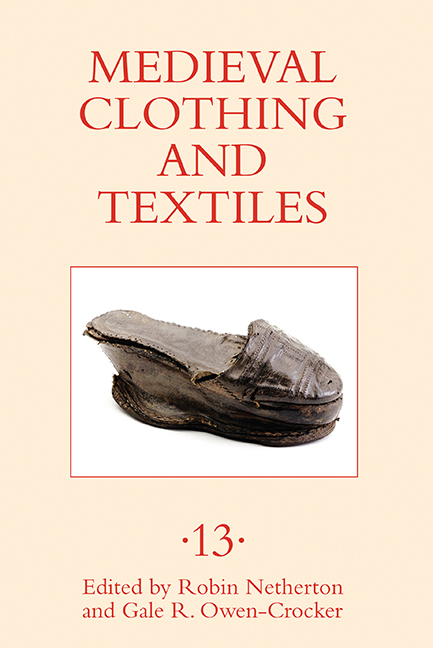Book contents
- Frontmatter
- Contents
- Illustrations
- Tables
- Contributors
- Preface
- 1 The Significance of Dress in the Bayeux Tapestry
- 2 How Long Is a Launce? Units of Measure for Cloth in Late Medieval Britain
- 3 Robes, Turbans, and Beards: “Ethnic Passing” in Decameron 10.9
- 4 Calciamentum: Footwear in Late Medieval Lucca
- 5 “Bene in ordene et bene ornata“: Eleonora d’Aragona’s Description of Her Suite of Rooms in a Roman Palace of the Late Fifteenth Century
- 6 The Lübeck Wappenröcke: Distinctive Style in Fifteenth-Century German Fabric Armor
- Recent Books of Interest
- Contents of Previous Volumes
4 - Calciamentum: Footwear in Late Medieval Lucca
Published online by Cambridge University Press: 12 August 2020
- Frontmatter
- Contents
- Illustrations
- Tables
- Contributors
- Preface
- 1 The Significance of Dress in the Bayeux Tapestry
- 2 How Long Is a Launce? Units of Measure for Cloth in Late Medieval Britain
- 3 Robes, Turbans, and Beards: “Ethnic Passing” in Decameron 10.9
- 4 Calciamentum: Footwear in Late Medieval Lucca
- 5 “Bene in ordene et bene ornata“: Eleonora d’Aragona’s Description of Her Suite of Rooms in a Roman Palace of the Late Fifteenth Century
- 6 The Lübeck Wappenröcke: Distinctive Style in Fifteenth-Century German Fabric Armor
- Recent Books of Interest
- Contents of Previous Volumes
Summary
The Tuscan city of Lucca was ruled as an independent commune in the late fourteenth and fifteenth centuries. As such it not only has its own records of political events, but also extensive holdings of customs accounts, commercial transactions, court records, and private documents. In these records footwear is both ubiquitous and elusive. Household accounts frequently mention the acquisition of shoes and to a lesser extent hose, yet in other sources in which clothing is listed, such as inventories or records of items seized as security for debt, footwear very rarely appears. Shoemakers and cobblers are among the most frequently mentioned types of artisan, but this is often in contexts that reveal little about the circumstances of their trade. There are problems too about the precise meaning of terms for footwear. The distinction between shoes and hose is less clear-cut than might be supposed; shoes could be made of cloth, and stockings might have soles. There are, however, a number of regulations, petitions, and contracts featuring footwear of various kinds, which convey a little more about its nature and the circumstances of its production. This article will consider what late medieval Lucchese sources can be made to reveal about footwear in the two or three decades on either side of 1400. It will proceed by discussing first demand and the acquisition of footwear, and then its manufacture and supply, particularly as shown through regulations and disputes, which can shed light on the nature of different kinds of footwear and the meaning of terms used for it.
Lucca unfortunately has very few of the ricordi or family memoirs which have proved so fruitful a source for fourteenth- and fifteenth-century Florence, but two, both of them relating to doctors, are preserved in the Lucchese archives in the series Spedale di San Luca. In the case of servants, it was not the practice to make payments of the agreed salary on a regular monthly basis, but rather to run an account which would record small cash payments and anything paid to third parties on the servant's behalf, with the totals being worked out every so often. These accounts frequently included payments to shoemakers for footwear, and can provide useful information on the frequency of such purchases and the relative costs of the various items.
- Type
- Chapter
- Information
- Medieval Clothing and Textiles 13 , pp. 83 - 106Publisher: Boydell & BrewerPrint publication year: 2017

